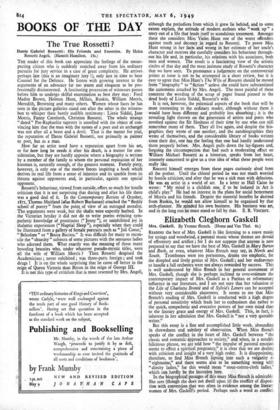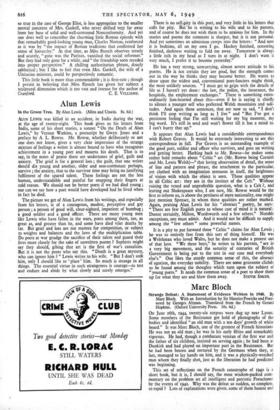Elizabeth Cleghorn Gaskell
Mrs. Gaskell. By Yvonne ffrench. (Home and Van Thal. 6s.) READING the best of Mrs. Gaskell is like listening to a suave music for strings and woodwind, a pastoral music whose themes are devoid of effrontery and artifice • for I do not suppose that anyone is now prepared to say that we have the best of Mrs. Gaskell in Mary Barton and Ruth, or even, whatever Miss ffrench may say, in North and South. Trombones were too portentous, drums too emphatic, for the dimpled and lively genius of Mrs. Gaskell ; and her endeavours to handle a full orchestra were not always rewarded by success. This is well understood by Miss ffrench in her general assessment of Mrs. Gaskell, though she is perhaps inclined to over-estimate the contemporary impact of Mrs. Gaskell as a Puritan or reformatory influence in our literature, and I am not sure that her valuation of the Life of Charlotte Bronte and of Sylvia's Lovers can be accepted without very considerable abatement. It seems to me that Miss ffrench's reading of Mrs. Gaskell is conducted with a high degree of personal sensitivity which leads her to enthusiasm due rather to the quick, sympathetic and evocative powers of her own mind than to the literary grace and energy of Mrs. Gaskell. This, in fact; is inherent in her admission that Mrs. Gaskell is "not a very quotable writer."
But this essay is a fine and accomplished little work, abounding in shrewdness and subtlety of observation. When Miss ffrench speaks of the conflict in the heart of Mrs. Gaskell between " the classic and romantic approaches to society," and when, in a notably felicitous phrase, we are told how " the impulse of pastoral emotion seems to effect a spiritual pregnancy," it is clear that we are dealing with criticism and insight of a very high order. It is disappointing, therefore, to find Miss ffrench lapsing into such a vulgarity as "eightsome," and there seems also to be something wrong with "dimity ladies," for this would mean "stout-cotton-cloth ladies," which can hardly be the intention here.
In the biographical passages of this essay Miss ffrench is admirable. She sees (though she does not dwell upon it) the conflict of disposi- tion with convention that was often in evidence among the literary women of Mrs. Gaskell's period. Perhaps such a word as conflict, so true in the case of George Eliot, is less appropriate to the smaller mental concerns of Mrs. Gaskell, who never drifted vety far away from her base of solid and well-cemented Nonconformity. And yet one does well to remember the charming little Roman episode with that remarkably good-looking young man, Charles Norton, reinforced as it was by " the impact of Roman traditions that confirmed her sense of hierarchy." At that time, as Miss ffrench observes tersely and acutely, " gone was the Puritan, vanished the social reformer." But they had only gone for a while, and " the friendship soon receded into proper perspective." A chilling authoritarian phrase, dourly sabbatical ; but I like to feel that even Mrs. Gaskell, the wife of a Unitarian minister, could be perspectively romantic.
This little book is more than commendable ; it is first-rate ; though I persist in believing that Miss ffrench has given her subject a sculptural dimension which is too vast and intense for the author of







































 Previous page
Previous page